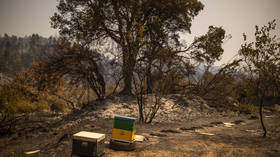‘Catastrophic harm’: More than 200 health journals call for urgent climate action

More than 200 journals are joining forces to issue an editorial voicing climate change concerns, imploring world leaders to act to protect populations against the “catastrophic harm” of rising temperatures.
The editorial, which has been printed in the British Medical Journal, the Lancet, and the New England Journal of Medicine, among other notable publications, is the first time so many publishers, over 200, have come together. The journals state they “are united in recognising that only fundamental and equitable changes to societies will reverse our current trajectory.”
Entitled ‘Call for emergency action to limit global temperature increases, restore biodiversity, and protect health’, the missive has been published ahead of the UN General Assembly in September and November’s climate conference in Glasgow.
“The science is unequivocal; a global increase of 1.5°C (35F) above the pre-industrial average and the continued loss of biodiversity risk catastrophic harm to health that will be impossible to reverse,” the authors warned. Already existing damages to health include increased dermatological illnesses, tropical infections, negative impacts on mental health and pregnancy.
Also on rt.com Germany launches ‘negligent homicide’ investigation over fatal floods, regional chief at forefront of probeThe journals stress that the environmental crisis affects lower income nations more, while they have “contributed least to the problem and are least able to mitigate the harms.” As a result, this will only heighten existing issues such as food insecurity, disease, and conflict, the publication warns.
While the missive recognizes that many governments and businesses are setting targets of zero-net emissions for 2030, “these promises are not enough.” Higher-income states must “meet and go beyond their existing commitment” to fighting climate change.
The editorial echoes similar alarms from the UN’s Intergovernmental Panel on Climate Change last month that “unequivocally” blamed humans for climate change in a bombshell report described as a “code red for humanity.”
Extreme weather conditions have hit multiple corners of the Earth this summer alone, including forest fires in Russia, Greece, and Turkey, while extreme flooding devastated Germany and neighboring Belgium and the Netherlands.
Also on rt.com ‘Code red’: UN issues dire warning about climate change, pinning blame ‘unequivocally’ on humansLike this story? Share it with a friend!














